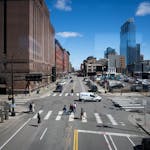Years after he moved back to the reservation, Herb Sam still showed up at the Pow Wow Grounds coffee shop in Minneapolis on Friday mornings to lend an ear to a troubled soul.
"He had his spot," said Robert Rice, owner of the gathering spot on Franklin Avenue. "He'd come in, order a diet Coke or a decaf coffee or tea, and just be with people. Every now and then there'd be a quiet conversation with individuals who were struggling."
A respected Ojibwe elder and healer, Sam centered his life around guiding everyday people through tough times. But religious, business and political leaders, including Gov. Mark Dayton, also valued Sam's wisdom, and called on him for blessings.
Sam died of liver cancer on Sept. 14 at his home on the Mille Lacs Indian Reservation in Hinckley. He was 76.
"He was one of those spiritual and cultural caretakers that people would come to — people who were Ojibwe and people who weren't," said Jamie Edwards, director of government affairs for the Mille Lacs Band. Edwards was a relative of Sam's and a pallbearer at his funeral, which drew tribal members from as far away as Oklahoma.
"He impacted the lives of so many who might have been dealing with childhood trauma, addiction or illness," Edwards said. "He helped people who were down-and-out, struggling to come back to the culture or who understood the culture and sought his help because of it."
Sam was born on the reservation in Isle, Minn., on Dec. 16, 1941. As a child, he was taken away to a boarding school in Pipestone, Minn., with the promise of candy. In speeches, Sam often shared the trauma of being stripped of language and culture. After boarding school, when Sam returned to his grandparents' home, he relearned his Ojibwe language and used it as a bridge for many urban Indians he mentored, many of whom had never heard it spoken before.
In 1958, Sam enlisted with the U.S. Army and was sent for training in Germany in the early days of the Vietnam War.
Though said to have been a hell-raiser in his youth, Sam eventually felt called to walk a more spiritual path, sometimes referred to as the "Red Road." He had a gift for understanding people's suffering and helping them find peace, said Robert DesJarlait, who first met Sam in Minneapolis in 1982.
"It was the first year of my sobriety and my own path on the Red Road," said DesJarlait, who now lives in Onamia, Minn. "He was always willing to help urban Indians out. That was his calling. We didn't have, and still don't have, a lot of spiritual men or women who are willing to work with the urban community."
DesJarlait credits Sam with helping him reclaim his Ojibwe identity when he was 58 years old. When DesJarlait was diagnosed with cancer, Sam complemented DesJarlait's medical treatment with traditional healing and counsel.
It was his smile and twinkle in his eye that drew his wife, Patty, to him. They met on a trip to Switzerland, where she was performing as a jingle dress dancer and he was the group's spiritual adviser. They became friends first. When Patty took her young daughter and fled an abusive marriage, Sam encouraged her to move to the Twin Cities.
"He made sure I was safe," she said. "We were together for 22 years. All I ever saw was who he was inside. He was sincere and honest and never tried to change people, no matter who they were, what religion they were, and whether they were black, yellow, red, green or purple."
Dayton asked him to lead a private smudge ceremony when the Capitol reopened last April following renovation. He delivered the opening prayer at the 2012 Minnesota DFL state convention in Rochester and spoke to the staff at Hennepin County Medical Center and others about incorporating traditional medicine.
"When you have an elder like Herb die, you lose another book of knowledge," DesJarlait said. "Herb taught us things. Now we need to take what Herb taught us and try to teach those things to others."
Services have been held.





